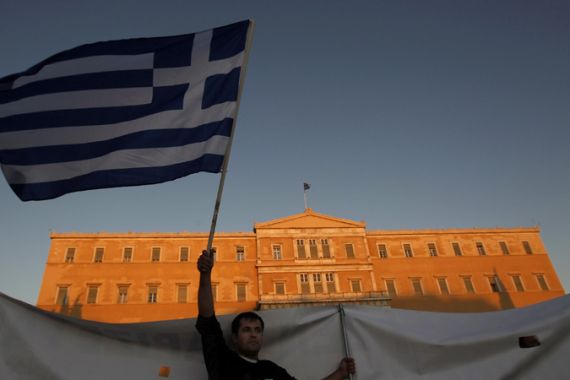
Greece: Euro rescue on the brink?
A look at the implications for the eurozone if Greece leaves the euro and how Greeks feel about the debt crisis.
At the G20 summit in Cannes Germany and France made it clear that the door is open for Greece to leave the euro, whatever the outcome of the political machinations in Athens. So what do the Greek people want, having seen their country used almost as a sort of global punch bag? And are the banks past caring now about Greece? Have they in effect written off Greece already?
Sir David Frost discusses with Prokopis Doukas, a news anchor for the Hellenic Broadcast Corporation, and David Bloom, the global head of foreign exchange strategy at HSBC, how the Greek people feel about the debt crisis, austerity measures and their political system; they also talk about implications for the eurozone if Greece decides to leave the euro and how to solve the global debt crisis.
Libya is hoping to put its darkest times behind it. This week the NATO operation which helped overthrow the regime of Muammar Gaddafi officially ended and Libya now has an interim government. But amidst all the ‘congratulatory backslapping’ at NATO, some are still wondering why NATO intervened so decisively in Libya, but refuses to do so in Syria.
Anders Fogh Rasmussen, the NATO secretary general, speaks about the successful intervention in Libya and why NATO has no intention to intervene in Syria.
“The conditions for such an operation are not fulfilled, there is no United Nations mandate [to protect the civilian population], there is no support from the region, and I think Libya and Syria are two different cases. I strongly condemn the security forces crackdown on the civilian population in Syria and I urge the political leadership in Syria to listen to the people to introduce democracy, and I also think it could facilitate such a process if the Arab League, if countries in the region put a maximum of pressure on the Syrian leadership.”
Kenyan troops are continuing their military operations in Somalia, where they are trying to root out al-Shabaab fighters believed to be responsible for the recent kidnappings inside Kenya. The decision to send troops into Somalia appears to be something Kenyans have been considering for some time.
Abdirahman Omar Osman from the transitional federal government of Somalia explains why the troops from Kenya are welcome for a temporary operation in Somalia and how they are trying to battle al-Shabaab, to be able to establish a permanent government Somalia.
| Life as a mercenary |
Rock star Lenny Kravitz talks to Sir David about his family, career, his new album Black and White and the issues behind it.
Twenty years ago a book was published that was to become the bible of the oil industry: The Price: The Epic Quest for Oil, Money and Power. It was written by Daniel Yergin, an energy consultant and guru, and it earned him the Pulitzer Prize. He has just published the long-awaited follow-up, The Quest: Energy, Security and the Remaking of the Modern World. He discusses one of the challenges of the future: Will enough energy be available to meet the needs of a growing world and at what cost and with what technologies?
In 2008, the former mercenary Simon Mann was jailed in Equatorial Guinea in West Africa, a country where he had planned to overthrow the government in a military coup. Although he was sentenced to 34-years in prison, the president pardoned him after just 15 months. Mann has written a book about his experiences and he joins Sir David to talk about his life as a mercenary.